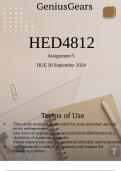HED4812
Assignment 5
DUE 30 September 2024
,1. Define the key indigenous and traditional
leadership principles discussed in the module. How do these principles
contribute to fostering cultural diversity within educational leadership?
Key Principles:
●
Community-Centered Leadership: Emphasizes the collective well-being over individual gains, fostering a
sense of belonging and responsibility within the community.
●
Holistic Approach: Considers the spiritual, emotional, physical, and intellectual aspects of individuals,
promoting balanced development.
●
Eldership and Wisdom: Values the guidance of elders who possess wisdom and experience, ensuring
decisions are informed by historical and cultural knowledge.
●
Relational Leadership: Focuses on building strong, respectful relationships and networks, recognizing the
interconnectedness of all members.
●
Consensus-Based Decision Making: Prioritizes collective agreement and inclusive participation, ensuring tha
all voices are heard and respected.
●
Respect for Nature: Integrates respect for the environment and sustainable practices into leadership, reflectin
a deep connection to the land and its resources.
●
Cultural Continuity: Maintains and promotes traditional customs, languages, and practices, ensuring cultural
heritage is preserved and passed on.
Contributions to Cultural Diversity in Educational Leadership:
●
Inclusivity and Representation: By embracing diverse cultural perspectives, educational leaders can create
more inclusive environments where all students feel represented and valued.
●
Cultural Competence: Educators who understand and respect indigenous principles are better equipped to
engage with students from various backgrounds, fostering a richer educational experience.
●
Enhanced Collaboration: Emphasizing relational and community-centered leadership encourages collaboratio
among students, teachers, and parents, leading to a more cohesive educational community.
●
Sustainable Practices: Integrating respect for nature and holistic approaches into the curriculum can promote
sustainability and environmental stewardship among students.
●
Resilience and Adaptability: Drawing on the wisdom and experiences of elders can provide educational
leaders with insights into resilience and adaptability in the face of challenges.
2. Provide examples of indigenous and traditional leadership practices that you
find particularly relevant to educational leadership. How might these practices
be applied in a modern educational setting? Integration (15 Marks):




